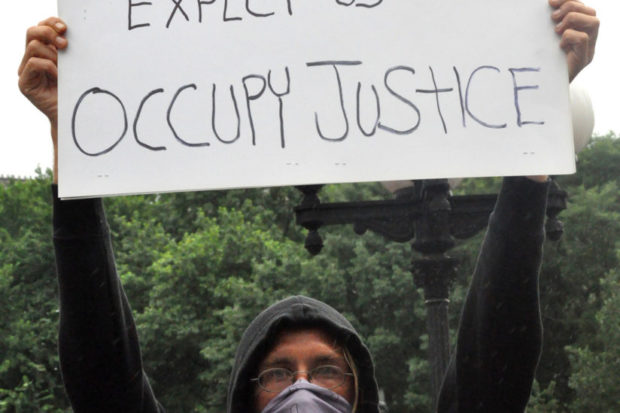
By Jonathan Luevanos
The Community Alliance newspaper recently published an article titled “ACLU Sues Over Failing Public Defense System in Fresno County: Tens of Thousands Go Without Legal Representation That the Constitution Guarantees.” The article notes that the ACLU “filed a lawsuit against Fresno County and the State of California, seeking an overhaul of the county’s deficient public defense system.”
In the article, ACLU attorney Novella Coleman emphasizes that underneath the juridical paradigm of the law, there exists a bias. “The severe underfunding of the Public Defender’s Office, which serves many people of color, is just another manifestation of the racial bias inherent at every stage of our criminal justice system—from the moment of arrest, to charging decisions, to bail determinations, to selection of jury members, and to verdicts and sentencing.”
To properly understand how racial bias works within the criminal justice system and how it influences the way power is formed not only in Fresno County but also throughout the State of California in general, one must take into consideration the histories in which individuals are immersed and the conditions that have led to the formation of a complex system of power relations.
Historical and Political Discourse
In Society Must Be Defended, philosopher and social historian Michel Foucault explains that in order to understand how power works in the world, “one would have to abandon the juridical notion of sovereignty. That model presupposes the individual as a subject of natural rights or original powers.” For Foucault, the nature of power is constituted by a “historical-political discourse, a discourse in which truth functions as a weapon for a partisan victory, a discourse at once darkly critical and intensely mythical.”
The historical-political discourse is not concerned with a “rational” subject with natural rights, but it is concerned with a subject involved in power struggles that continue to “rage within the mechanisms of power—or at least to constitute the secret driving force of institutions, laws and order.”
Foucault claims that “beneath the omissions, illusions and lies that make us believe in the necessities of nature or the functional requirements of order, we are bound to reencounter war.” It “continuously divides the entire social body; it places each of us in one camp or the other.” Through that “general struggle in which he (the subject) speaks, he is necessarily on one side or the other; he is in the battle, he has adversaries, he fights for a victory.” The subject of historical-political discourse “tries to make right prevail, but the right in question is his particular right marked by a relation of conquest, domination or antiquity: rights of triumphant invasions or millennial occupations.”
Consequently, the nature of racial bias is not a problem of the law, of legislation, of execution of the law, or a problem of court procedure. The problem of racial bias is concerned with conflicting power struggles, and it is to be understood in terms of a historical-political discourse in which political officials in Fresno County such as Sheriff Margaret Mims operate a racist agenda that influences the outcome of policy and criminal justice practices while undermining the meaningful histories or experiences of economically lower-class people.
Racial Bias of the Fresno County Sheriff’s Department
One should pay close attention to the ongoing turmoil between the Fresno County Sheriff’s Department and the people of Fresno. Sheriff Mims has recently further developed relations with Immigration and Customs Enforcement (ICE). Although Mims’ Sheriff’s Department apparently operates within the limits of the law, the motivation and effects of her policies transcend the juridical paradigm of the law. Mims’ recent aggressive policy to let ICE have open access to the Fresno County Jail is reflective of the ongoing popular racism ignited by Donald Trump, a Republican presidential candidate, who recently claimed that Mexicans who come to the United States are “bringing drugs. They’re bringing crime. They’re rapists.”
Another point of reference for Mims is the objectification of an immigrant individual who killed an innocent Caucasian woman on July 1 in the sanctuary city of San Francisco. Many politicians across the state, including Sen. Dianne Feinstein, have taken advantage of the situation and started a political war against immigrants. The racial bias of Mims’ policies along with the hateful comments by Trump and the political inconsistencies of Feinstein are veiled or masked by what Foucault calls “a rationality that…becomes increasingly fragile, more and more spiteful, more closely tied to illusion, to fancy, to mystification.”
Mims’ department has no business interacting with immigrants in Fresno County, not only because her legal or jurisdictional responsibilities as sheriff do not include an administration of immigration enforcement but also because her discourse on immigration is racially biased and she does not understand the historical-political discourse in which immigrants are immersed. Mims’ recent refusal to meet with progressive community leaders to address ICE issues is exemplary of the reality of conflicting power struggles in Fresno County.
Conclusion
The spectrum of criminal justice practices starting from the impunity of the Fresno Police Department to the irrationality of Mims’ policies to the erroneous mishandling of the Public Defender’s Office calls for a requirement to analyze the nature of social and political power in Fresno County in terms of a historical-political discourse of power struggles.
A historical-political discourse informs the struggles of oppressed people such as African Americans, Asian Americans and Chican@s. A historical-political discourse “undertakes not to measure history, unjust governments, abuses, and acts of violence with the ideal principle of a reason or a law but, rather, to awaken, beneath the form of institutions or laws, the forgotten past of real struggles, of masked victories or defeats, the dried blood in the codes.” It is a “discourse that will be able to carry both the nostalgia of decaying aristocracies and the ardor of popular revenges.”
*****
Jonathan Luevanos can be contacted at jluevanosfelix@gmail.com.
